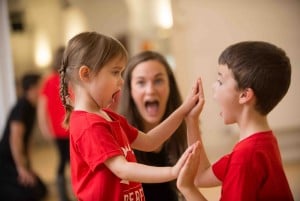
This week, I’m delighted to introduce a guest blogger - Peter Saxby. Peter was an NHS Consultant Clinical Psychologist and Head of Psychology Services before developing a full-time private practice with clinics in several BMI Healthcare Private Hospitals. He specialises in individual and group therapy based on role play and skills training for adolescents and adults with low self-confidence and high social anxiety.
Peter’s grandchildren attend Perform and over the years, he has enjoyed watching our open workshops and presentations and always admired the skills and enthusiasm of our leaders. I’ve asked him to write briefly about the value of role play in a drama setting from a psychologist’s perspective.
Weekly drama sessions such as those at Perform that are heavily role play based help children to be more creative, to come up with new ideas and explore ways of seeing and interpreting the world around them. Through role play, they can practise responding to situations in new ways, as well as recreating past experiences - these could be everyday (like stroking a cat) or traumatic (like having an argument with a friend). They soon discover that they are able to practise responding in different ways in role play activities; ways that might be threatening in real life without previous practice.
Often, children, like adults, know what to do (e.g. acting in a confident way by smiling, making eye contact and speaking firmly) and know how to do it but need to be given the opportunity to practise this. This is something that is carried out on a weekly basis at Perform and is invaluable to children’s development.
At times we also need positive feedback; being told what is good and being helped to modify what’s not so helpful (e.g. extending eye contact for too long so that it looks like you are in a staring competition). Therefore, watching others who are imitating and role playing can increase emotional understanding and empathy. We gain insight by observing expressions of feelings and behaviour by other people, as well as becoming more aware of our own hidden emotions which are powerful to us but may well not be visible to others.
Role play needs to be led by skilled leaders - like the Perform teachers - who will help participants through structured exercises to improve their attention and concentration and help them to maintain consistency of behaviour (staying in role). The leader may also help them to better appreciate and respond to cultural diversity – e.g. what is seen as assertive in some groups may be seen as aggressive in other social settings.
Through participation in role play and drama with trained leaders, children will improve skills of social interaction, communication and performance, as well as increasing understanding of their own and others’ feelings.
One of the Perform games that I enjoyed watching was “Copy Gesture” a mirror-style game where the children were asked to copy the teacher’s actions. This type of exercise in young children is excellent for improving communication and developing practical skills. Imitating the behaviour of others is essential for the development of humans and animals. Lion cubs learn how to catch their prey by watching and following their parents. We often learn new skills best by being shown how to carry out actions and then repeating them over and over again, for example copying dance steps or putting together pieces of a Lego model.
I wholeheartedly endorse Perform drama classes and I think that children can benefit hugely from taking part in the workshops.
Click here to find out more about Perform helps child development plus our new term themes.


